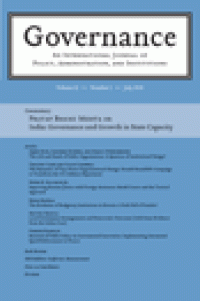
Journal Articles
More Knowledge, Better Government? Consequences of Knowledge-Based Decision Making in Swedish Pharmaceutical Benefits
Using an example from the health-care sector, we illustrate consequences of implementing knowledge-based decision making relating to the exercise of political control. The Swedish Pharmaceutical Benefits Board decides the subsidization status of prescription pharmaceuticals. Building on a study of the agency's work, we explore the effects of institutional arrangements stemming from rationalistic demands for knowledgeable and justifiable outcomes related to political structures for control. Knowledge about the medical and economic effects of pharmaceuticals is routinely ambiguous. This makes it necessary to negotiate “decision-able” knowledge rather than to merely collect it. This touches on matters of broader political consequence, which the formal model for governing the administration does not take into account. This masks decisions as neutral administrative choices. A further conclusion concerns the lack of mechanisms for repoliticizing politically salient issues that have been delegated to administrative bodies.
Availability
No copy data
Detail Information
- Series Title
-
Governance
- Call Number
-
-
- Publisher
- Hoboken, United States : Wiley-Blackwell., 2011
- Collation
-
-
- Language
-
English
- ISBN/ISSN
-
09521895
- Classification
-
-
- Content Type
-
-
- Media Type
-
-
- Carrier Type
-
-
- Edition
-
Volume 24, Issue 1, January 2011. pages 85–110
- Subject(s)
- Specific Detail Info
-
-
- Statement of Responsibility
-
-
Other version/related
No other version available
File Attachment
Comments
You must be logged in to post a comment
 Computer Science, Information & General Works
Computer Science, Information & General Works  Philosophy & Psychology
Philosophy & Psychology  Religion
Religion  Social Sciences
Social Sciences  Language
Language  Pure Science
Pure Science  Applied Sciences
Applied Sciences  Art & Recreation
Art & Recreation  Literature
Literature  History & Geography
History & Geography